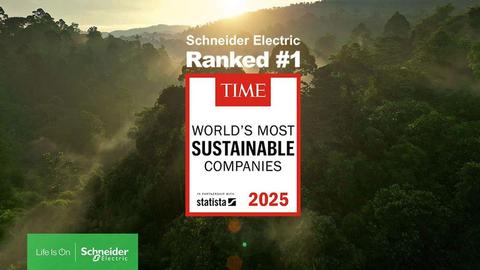Analyses & Studies • Publications
Singapore’s Digital Sustainability Leaders Are Three Times More Likely to Have Confidence in Achieving Sustainability Targets

- Almost two-thirds of Leaders say they have a dedicated sustainability team in their organisation
- Leaders are ahead in tracking and reducing carbon emissions
Singapore, 3 October 2023 – A new report by Schneider Electric, the global leader in the digital transformation of energy management and automation, reveals that organisations focusing on digitalisation to pursue sustainability outcomes are significantly more confident of achieving their goals.
Titled “Thriving in the Green Economy”, the report analyses the findings of a survey of 500 business leaders in Singapore from a range of industries that was conducted between May and June 2023.
Real estate and data centre companies lead, while professional services firms lag in digital sustainability efforts
The study identifies around one-third (35%) of Singaporean business leaders as “Digital Sustainability Leaders”, as they strongly believe that digitalisation is a key driver of their organisation’s sustainability strategy. 59% are “Digital Sustainability Adopters” as they do not believe in pursuing digitalisation as strongly, and 7% of respondents are “Digital Sustainability Sceptics” as they either disagree or are unsure of the importance of digitalisation in advancing sustainability.
It was also found that respondents from the real estate, data centre, automotive, and e-mobility sectors were more likely than peers from other industries to be “Digital Sustainability Leaders"; while respondents from the professional services, FMCG, transportation, and infrastructure sectors were more likely to be “Digital Sustainability Sceptics”.
Digital Sustainability Leaders more confident of achieving their sustainability targets
According to the study’s results, Digital “Sustainability Leaders” are around three times more confident of attaining their sustainability goals, with 61% being very confident in doing so, compared to only 16% of “Digital Sustainability Adopters” and 8% of “Digital Sustainability Sceptics”.
“Digital Sustainability Leaders” are also working on shorter time horizons, with 31% working towards goals set for the next year or less, while only 19% of “Digital Sustainability Adopters” and 8% of “Digital Sustainability Sceptics” were doing the same.
Digital Sustainability Leaders have more comprehensive sustainable practices
Based on the study, “Digital Sustainability Leaders” are twice as likely (41%) to have comprehensive and integrated sustainability strategies with policies and targets in place, compared to 21% of “Digital Sustainability Sceptics”.
Almost two-thirds (64%) of “Digital Sustainability Leaders” also say their organisations have a dedicated sustainability team, compared to only 42% of “Digital Sustainability Adopters” and 18% of “Digital Sustainability Sceptics”.
Digitalisation is making a difference in combatting climate change
“Digital Sustainability leaders” are ahead in their efforts to track their impact on climate change. They are more likely than both “Digital Sustainability Adopters” and “Digital Sustainability Sceptics” to use Carbon Foot-Printing (40% vs 34% and 27% respectively), Supply Chain Analysis (38% vs 31% and 15%), and Lifecycle Assessment (34% vs 22% and 18%).
Around one in three “Digital Sustainability Leaders” also employ a wide variety of decarbonisation measures to reduce their impact, including Supply Chain Optimisation (36%), investing in Carbon Capture and Storage (32%), retrofitting buildings (32%) or better distributing energy resources (30%). Overall, only around one quarter of “Digital Sustainability Adopters” and one-fifth of “Digital Sustainability Sceptics” use such methods.
The commitment to decarbonisation, could be driven by “Digital Sustainability Leaders” being more likely to see climate change as a significant business risk at 60%, compared to “Digital Sustainability Adopters” at 42% and “Digital Sustainability Sceptics” at 30%.
“The correlation between digitalisation and sustainability is compelling. What can be measured can be accomplished, and with greater access to data and technology, organisations are in a much better position to monitor, plan and optimise their sustainability efforts. We see that decarbonisation in particular is being significantly aided by digital solutions, as companies strive to achieve increasingly ambitious net zero targets. However, this journey cannot be undertaken in isolation. Collaboration with the right partners is essential in adopting integrated digital solutions, and only by doing so can businesses mitigate emissions, promote circularity, and ultimately make more meaningful progress towards their targets,” said Yoon Young Kim, Cluster President, Schneider Electric, Singapore and Brunei.
The Schneider Electric Sustainability Survey 2023 was conducted with 4,500 business leaders across nine countries to gather their perspectives around sustainability and the environment. Organised in conjunction with partner Milieu Insight, the survey’s sample size included middle to senior-level executives in the private sector, and markets included Indonesia, Japan, Korea, Malaysia, Philippines, Singapore, Taiwan, Thailand, and Vietnam.
SOURCE: SCHNEIDER ELECTRIC


